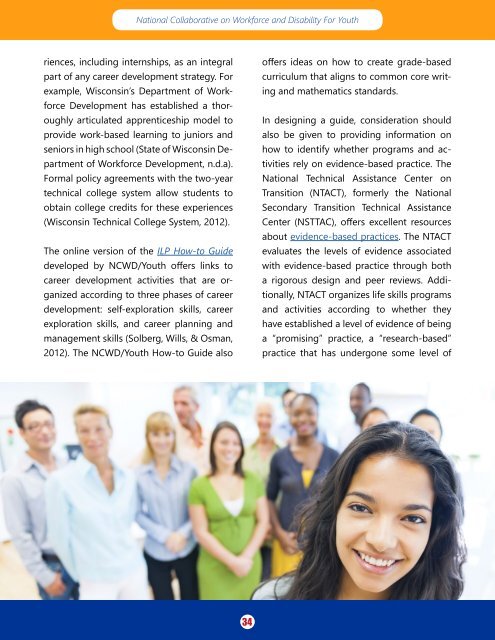Designing Statewide Strategies & Programs
DesigningStatewideCareerDevelopmentStrategiesProgramsPub_0
DesigningStatewideCareerDevelopmentStrategiesProgramsPub_0
Create successful ePaper yourself
Turn your PDF publications into a flip-book with our unique Google optimized e-Paper software.
National Collaborative on Workforce and Disability For Youth<br />
riences, including internships, as an integral<br />
part of any career development strategy. For<br />
example, Wisconsin’s Department of Workforce<br />
Development has established a thoroughly<br />
articulated apprenticeship model to<br />
provide work-based learning to juniors and<br />
seniors in high school (State of Wisconsin Department<br />
of Workforce Development, n.d.a).<br />
Formal policy agreements with the two-year<br />
technical college system allow students to<br />
obtain college credits for these experiences<br />
(Wisconsin Technical College System, 2012).<br />
The online version of the ILP How-to Guide<br />
developed by NCWD/Youth offers links to<br />
career development activities that are organized<br />
according to three phases of career<br />
development: self-exploration skills, career<br />
exploration skills, and career planning and<br />
management skills (Solberg, Wills, & Osman,<br />
2012). The NCWD/Youth How-to Guide also<br />
offers ideas on how to create grade-based<br />
curriculum that aligns to common core writing<br />
and mathematics standards.<br />
In designing a guide, consideration should<br />
also be given to providing information on<br />
how to identify whether programs and activities<br />
rely on evidence-based practice. The<br />
National Technical Assistance Center on<br />
Transition (NTACT), formerly the National<br />
Secondary Transition Technical Assistance<br />
Center (NSTTAC), offers excellent resources<br />
about evidence-based practices. The NTACT<br />
evaluates the levels of evidence associated<br />
with evidence-based practice through both<br />
a rigorous design and peer reviews. Additionally,<br />
NTACT organizes life skills programs<br />
and activities according to whether they<br />
have established a level of evidence of being<br />
a “promising” practice, a “research-based”<br />
practice that has undergone some level of<br />
34


